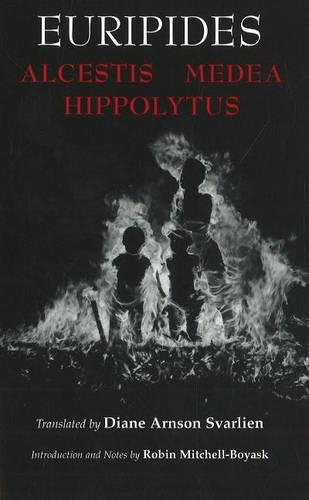
Alcestis, Medea, Hippolytus
(Hardback)
Available Formats
Publishing Details
Alcestis, Medea, Hippolytus
By (Author) Euripides
Translated by Diane Arnson Svarlien
Introduction by Robin Mitchell-Boyask
Hackett Publishing Co, Inc
Hackett Publishing Co, Inc
15th September 2007
United States
Classifications
General
Non Fiction
Ancient, classical and medieval texts
882.01
Physical Properties
Hardback
248
Width 140mm, Height 216mm
397g
Description
This new volume of three of Euripides' most celebrated plays offers graceful, economical, metrical translations that convey the wide range of effects of the playwright's verse, from the idiomatic speech of its dialogue to the high formality of its choral odes.
Reviews
Diane Arnson Svarlien's body of work means a quantum leap forward in the vibrancy and immediacy of classical verse drama. I first learned of her work when I was searching, madly, for a translation of Medea for a production I had been hired to direct. I sought out every published version. I tried to track down any unpublished ones rumored to exist. All the others were wanting; her translation was revelatory. Merely read her translation of the play, then read another. You will sense the difference. This is particularly true if you are a practitioner of theatre. --Patrick Wang, Director of Diane Arnson Svarlien's Medea in its world premiere at the Stella Adler Studio, and of the feature film In the Family, nominated for a Best First Feature Independent Spirit Award.
The excellent Introduction by Robin Mitchell-Boyask displays an admirable command of up-to-date scholarship and judiciously leaves controversial matters open to one's own interpretation. Arnson Svarlien's verse translation has both elegance and power--it reads well, not just to the eye, but (happily for the director and actors) also to the ear. --Ian Storey, Department of Classics, Trent University
Mitchell-Boyask's Introduction gives the reader a lively and accessible overview of Euripides' life, the circumstances of the original performances, and critical debate on the three plays. Footnotes to the translations provide students with useful background without over-burdening the text. The translations themselves are lively, vigorous, colorful, and direct, while remaining very close to the Greek; I laughed out loud more than once when I realized that, yes, this was exactly what Euripides had said. Arnson Svarlien has also taken care with the meter. Iambic trimeter, the 'spoken' meter of Greek, has been represented with iambic pentameter in English; but even in the lyric passages, whose meters do not translate into English, responsion within odes has been preserved. Yet all of this attention to such details of meter and accuracy sacrifices nothing in clarity or pace. Arnson Svarlien's translations are an ideal introduction to Euripides for students with no Greek and little knowledge of the ancient world. They remind me of why I love Euripides. --Laurel Bowman, Department of Classics, University of Victoria
Author Bio
Diane Arnson Svarlien earned her PhD in Classics at The University of Texas at Austin and lives in Lexington, Kentucky. Robin Mitchell-Boyask is Professor of Classics, Temple University.
